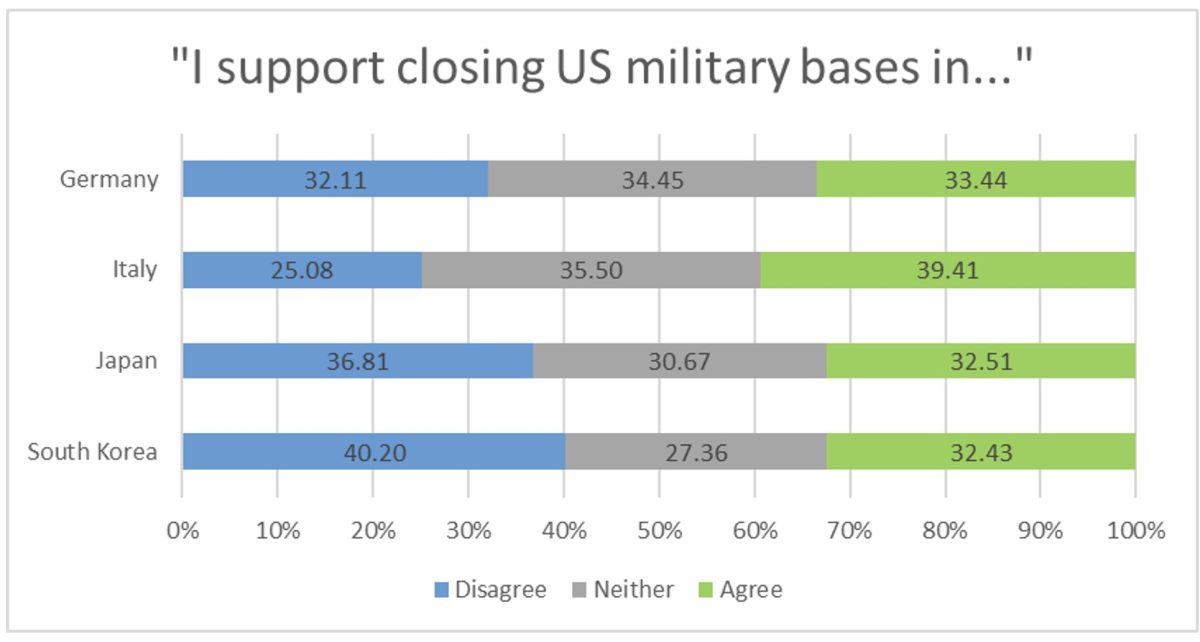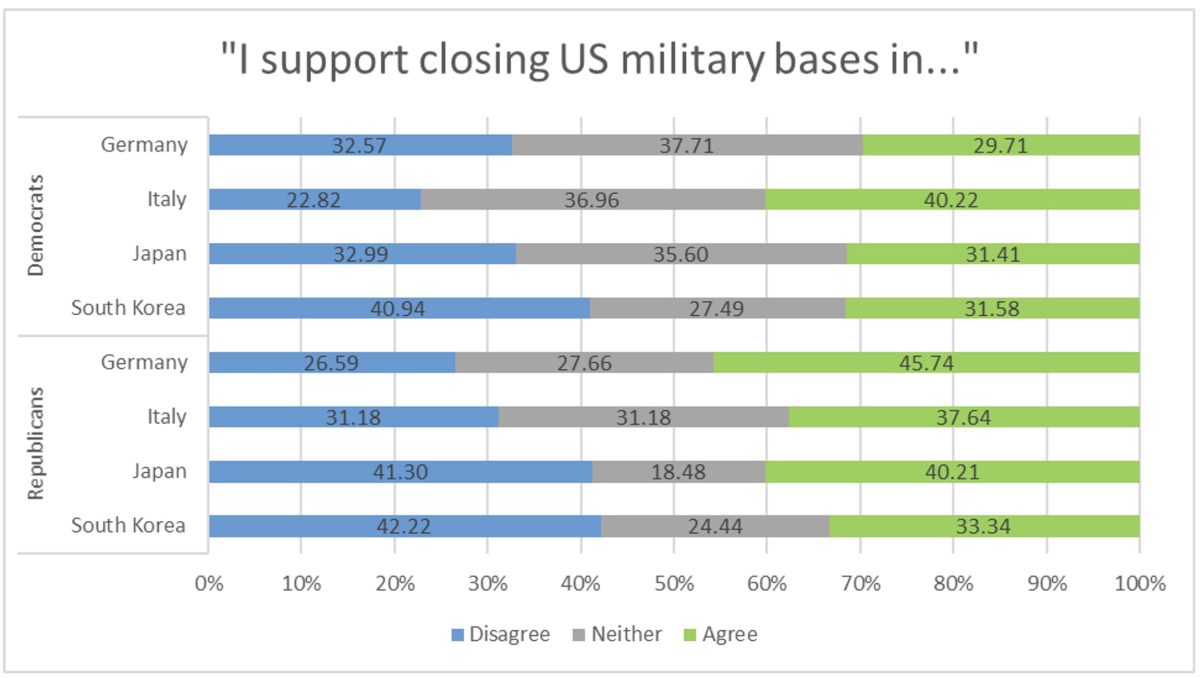
The United States military has a wide-reaching influence, with bases in about 80 different countries. These bases serve both as deterrents and allow for quicker reactions to situations far from their borders. However, these military bases have further implications for the United States and host nations. For example, the United States anticipated $18 billion US dollars to be spent on overseas operations in the fiscal year 2023, economically burdening taxpayers. The environmental impact of American military rations alone has contaminated drinking water in places like Okinawa, resulting in protests from citizens of the island. Evidence in the past several years shows an American public concerned about military spending as well as international commitments more broadly. The Ronald Reagan Presidential Foundation and Institute found a majority believed the US spends the right amount or too much on the military while also losing faith in the military. Yet, 2020 surveys from the Chicago Council on Global Affairs found 68% believe the US should remain engaged in global affairs, with 54% believing it should be increased, and another survey suggesting Americans prioritize alliances specifically in Europe and East Asia, stating 68% and 59% respectively view those partnerships as mutually beneficial.
To better understand the perspective of American citizens, we ask whether the US public supports closing US military bases abroad in four countries –Germany, Italy, Japan, and South Korea—and to what extent partisan or other attitudinal factors influence this view. The Trump administration repeatedly claimed that countries did not properly pay for American military bases, despite evidence to the contrary, and threatened to reduce the number of troops in Japan and South Korea if the host governments did not agree to a multifold increase in payments. In addition, the Biden administration reserved Trump’s planned reduction of troop levels in Germany. Yet, the Biden administration in 2021 began a review of the necessity of existing bases, with the possibility of closures or restructuring, both as means to cut spending but also to reorient to emerging challenges. Fatigue to long-term military commitments also may have led to a greater evaluation of some bases, especially in the aftermath of commitments to Afghanistan of over $822 billion.
However, the four countries with the largest US military presence now share little in common with Afghanistan but still function for deterrence and power projection. Japan hosts the largest American military presence, totaling approximately 54,000 military personnel. As Japan has increased its own defensive capabilities, in part due to concerns over China and North Korea, Japan’s efforts have become more balanced and integrated with US forces. South Korea hosts roughly 28,500 personnel, comprised mostly of soldiers from the Eighth US Army, and coordinates with South Korea to deter North Korean aggression. Germany and Italy host roughly 33,000 and 12,000 personnel respectively, which besides providing various means of support for responding to crises in North Africa and the Middle East, serve as a means to respond to potential Russian aggression. With the war in Ukraine, the Department of Defense further expanded personnel across Europe, now totaling roughly 100,000 personnel.
How does the US public view these bases? Existing cross-national research finds most have a neutral or positive view towards these US bases. A 2022 Chicago Council on Global Affairs survey found 72% of Americans supported the US bases in South Korea. The same survey indicates that around 67% of Americans support US bases in Japan, the highest since 2002. A separate Chicago Council survey found that 68% of Americans favored maintaining US bases in Germany. Despite a few instances of anti-base protests, the presence of the US is generally popular in these locations as well. For example, a Council on Foreign Relations 2019 survey found that a majority of South Koreans believe the continued presence of the US military is a deterrence. A 2022 Kyodo News survey found that while 80% that Okinawa shared an unfair burden in hosting, 65% accepted the alliance. Likewise, Germans appear to acknowledge the economic benefits and show concern on a potential military withdrawal in the region.
To address base closures, we conducted a web survey via mTurk Amazon of 1,228 American respondents on February 28, 2023. After a series of demographic and attitudinal questions, we randomly assigned respondents to receive one of four statements to evaluate on a five-point Likert scale (strongly disagree to strongly agree). This randomization allows us to see whether perceptions across the four commitments differ without having the perceptions of one question priming respondents to answer similarly on the others. These statements were:
Version 1: I support closing US military bases in Germany.
Version 2: I support closing US military bases in Italy.
Version 3: I support closing US military bases in Japan.
Version 4: I support closing US military bases in South Korea.
For simplicity, we recorded responses to a three-point scale (disagree, neither, agree) as seen below. Surprisingly, we see mixed results across all four bases, with roughly a third of respondents supporting closures and with support for closing Italian bases the highest at 39.41%. Next, we broke down responses by party identification. The largest distinction is on Germany, where almost half of Republicans (45.74%) but less than a third of Democrats (29.71%) supported closure, with an 8.8% difference across parties regarding Japan. Meanwhile, Democrats were only marginally more likely to support closures in Italy (40.22% vs. 37.64%), and little difference emerges across parties in views on South Korea.
The results here contrast with a 2022 survey that asked whether the US should close bases in Germany, South Korea, and Japan, where over 70% said no across all three. Instead of a major shift, however, this is likely in part a function of question wording and suggests that over a quarter of the public that may be indifferent about base closures default to a no when forced to choose.
We also asked two other questions that would potentially influence views here. One, we ask which of the following best describes one’s view of the US in world affairs; “We should pay less attention to problems overseas and concentrate on problems at home” or “It’s best for the future of our country to be active in world affairs.” As expected, those looking inward showed more support in closing bases across the board, with the smallest distinction on Italy (43.08% vs. 36.72%) and the largest on South Korea (38.17% vs. 27.88%).
Secondly, we asked respondents to rate on a 1-5 scale, from very negative to very positive, how they feel about several countries, including all four under analysis. Regression analysis surprisingly finds that for three of the countries, positive evaluations did not correspond with a statistically significant decrease in support for closing bases, with South Korea being the only exception. It is unclear why this is the case; although, it may suggest greater attention to South Korea’s security concerns.
Acknowledging the standard caveats about web surveys, the results suggest both a challenge in how to measure public support for military bases abroad and in explaining to the public the intention and necessity of these bases. Admittedly, we could not capture in our surveys pre-existing knowledge of bases, but we assume that Americans, especially those who have not served, are more likely to be aware of bases in Japan and South Korea and least likely to know about those in Italy. Considering we find the greatest support for base closures in Italy, by roughly 6%, suggests that Americans may have a harder time envisioning how these bases are strategic.
Economic concerns and changing threats may warrant the consolidation of bases but not necessarily the reduction of military presence, especially as tensions with Russia and China are unlikely to improve in the short term. If the Biden Administration wishes to avoid reducing America’s military imprint in both regions, it should place greater attention on clarifying the role these bases play in protecting American foreign policy interests.
Figure 1

Figure 2

This survey work was funded by generous resources from the Mahurin Honors College at Western Kentucky University.
Further Reading on E-International Relations
- Americans Largely Reject Closing Bases in Germany, South Korea and Japan
- How the American Public Views Nuclear North Korea
- The Conditionality of American Support for Sanctions on Russia
- Surveying Opinion on Withdrawing US Troops from Afghanistan and South Korea
- Opinion – What a Stronger Japanese Military Posture Means for Okinawa
- How Racial Injustice Undermines Democracy Promotion